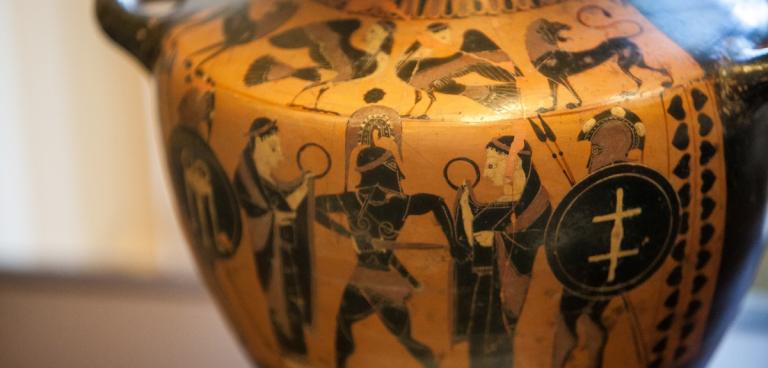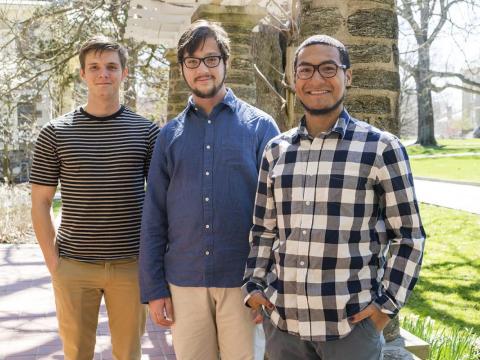
Classical Languages Major
Haverford’s Classical Languages major offers students the opportunity to gain proficiency in both Greek and Latin and to explore classical texts and the literary, historical, and philosophical contexts in which they emerged.
This major is one of four offered by the Classics Department. A small department with wide reach, we offer students the benefits of a close-knit academic community as well as access to a range of classes and faculty through our collaboration with Bryn Mawr’s Department of Greek, Latin, and Classical Studies.
Curriculum & Courses
Students pursuing the Classical Languages major must be able to read Greek and Latin at an advanced level, which entails four courses of Greek and four of Latin beyond the elementary level. At least two courses in each language must be at or above the advanced level. Language classes at this level (200- and 300-level) typically address a particular theme, text, or topic related to ancient language or culture through discussion and critical analysis. Through our partnership with Bryn Mawr, we also offer graduate-level Latin and Greek classes.
The major culminates with each student participating in the department-wide Senior Seminar and producing a Senior Thesis.
-
Major Requirements
Classical Culture Track (11 Courses)
Haverford’s track in Classical Culture offers students the opportunity to explore life in Classical antiquity in all of its dimensions—from language, to literature, to history, philosophy, archaeology, and more—as well as its impact on later cultural traditions. It is designed to allow the student to use a foundation in Greek or Latin as the springboard to chart their own paths through the College's rich offerings in archaeology and art history, history, politics, philosophy and religion, and classical literature and its reception.
- Two semesters in either Latin or Greek at any level.
- Seven elective courses, including at least two at the 200 level or above, and one at the 300 level or above. Such courses could include:
- Any Classical Studies, Greek, or Latin course (including cross-listed and tagged courses offered by faculty in other departments)
- With advisor approval, courses outside the department that engage with the ancient Mediterranean world or its afterlife; for example:
- other historical languages
- Archaeology, Art History, History, Religion, or Anthropology courses on Mediterranean, North African, and Near Eastern cultures
- courses on the reception of ancient Mediterranean culture, such as Medieval Studies, Comparative Literature, Museum Studies, or courses focused on the classical tradition
- Senior Seminar and Thesis (CSTS H398/CSTS H399).
Classical Languages Track (11 Courses)
Haverford’s Classical Languages track offers students the opportunity to gain proficiency in one of both of Greek and Latin or another classical language and to explore Classical texts and the literary, historical, and philosophical contexts in which they emerged.
- Six courses beyond the introductory level in Greek or Latin, of which at least four must be at the 200 level or above.
- Three elective courses. Such courses could include:
- Any Classical Studies, Greek, or Latin course (including cross-listed and tagged courses offered by faculty in other departments)
- With advisor approval, courses outside the department that engage with the ancient Mediterranean world or its afterlife; for example:
- other historical languages
- Archaeology, Art History, History, Religion, or Anthropology courses on Mediterranean, North African, and Near Eastern cultures
- courses on the reception of ancient Mediterranean culture, such as Medieval Studies, Comparative Literature, Museum Studies, or courses
focused on the classical tradition
- At least one of the above Greek, Latin, or Classical Studies courses must be at the 300 level or above
- Senior Seminar and Thesis (CSTS H398/CSTS H399).
Majors’ Reading List
The Majors’ Reading List consists of a group of essential Greek and Latin texts selected by the faculty, to be read in English (if not in the original) by the beginning of the senior year. Many of these texts will have been assigned in different classes, while others will complement class readings. By reading, considering, and discussing the texts on the list, Classics students—whatever the focus of their particular major—will emerge with a stronger common basis for discussion and with a better sense of the range and depth of the Classical heritage. For most works a particular translation or translations is suggested on the department website, but if students would like to read a different version, they may consult with any faculty member to learn whether the translation is a reasonable alternative. (The list is posted on the departmental website at https://www.haverford.edu/classics/reading-list.)
Senior Project
The senior experience in the Department of Classics builds towards the writing of a senior thesis (typically 35 to 45 pages) on a topic of the student’s choice, under the guidance of two faculty members. In their theses, Classics students present original work based on serious and extensive research, extending knowledge about antiquity and its reception in innovative and illuminating ways.
Senior Seminar, a weekly course conducted during the fall semester, provides a forum in which students are introduced to a variety of theoretical approaches, further develop the ability to read and critique scholarship, and learn about resources for research in the field; it also gives them an opportunity to craft an interesting and appropriate question that they will explore in the thesis they write during the spring semester.
Senior Project Learning Goals
In the process of writing the senior thesis, students should acquire and demonstrate:
- the ability to craft an interesting and appropriate question in order to make a new contribution to the field of Classics.
- the ability to read relevant ancient texts, in the original languages as appropriate, and to discuss and analyze aspects of Classical culture.
- a familiarity with relevant modern scholarship and engagement with the methods and standards of the discipline of Classics.
- the ability to develop an article-length paper, consisting of original work, under the mentorship of two faculty.
Senior Project Assessment
The thesis is evaluated on the following criteria:
- Conceptualization of an original research question
Students strive to acknowledge and explore the full implications of an innovative thesis question. Students demonstrate with depth and precision the importance of the question and what is at stake in answering it. - Familiarity with and understanding of primary texts
Students engage primary sources to answer their research question. Their primary evidence is well organized, exhaustive, and integrated with the continuing scholarly conversation to which they are contributing. Students strive to display a creative approach to existing sources or bring new and illuminating sources to bear on their research question. - Engagement with secondary literature
Students demonstrate comprehensive mastery of scholarly literature as it pertains to the thesis topic by synthesis of and contribution to the scholarly conversation. - Methodological and theoretical approach
Students ground their theses in current knowledge about antiquity, demonstrating a thorough understanding of relevant methodological and theoretical issues. - Quality of argument
Students construct a well-reasoned, well structured, and clearly expressed argument; the line of thought emerges clearly, and the conclusions are persuasive. - Clarity of writing
Writing is consistently engaging, clear, well organized, and enjoyable to read. - Oral presentation
At the end of the semester, students demonstrate comprehensive understanding of their topic in an articulate and engaging presentation and are able to provide innovative and thoughtful answers to questions.
Requirements for Honors
Students demonstrating superior performance in course work in the major and on the senior thesis will be eligible for departmental honors. To qualify for honors, students must have a cumulative GPA of at least 3.7 in their major courses (3.85 for high honors) and earn a grade of at least 3.7 on the senior thesis (3.85 for high honors).
Research & Outreach

Classical languages major and classical culture and society minor Paul Brucia Breitenfeld ’19 used the cultural allusions in a second-century North African Latin novel to understand the reach and oppression of the Roman empire.

Romano's thesis utilized mapping technology to explore the relationship between Greek myth and the religious conception of deities.

Three members of the class of 2018 won the inaugural Utraque Lingua Grants, which support further study of Latin and Greek.
Keep Exploring
More Programs
Check out our other academic offerings:
Get in Touch
Join the Mailing List or search for events in your area.
You can find detailed instructions and information on the Application Instructions page. If you need to contact us directly, please send an email to admission@haverford.edu.
Get Social with Haverford